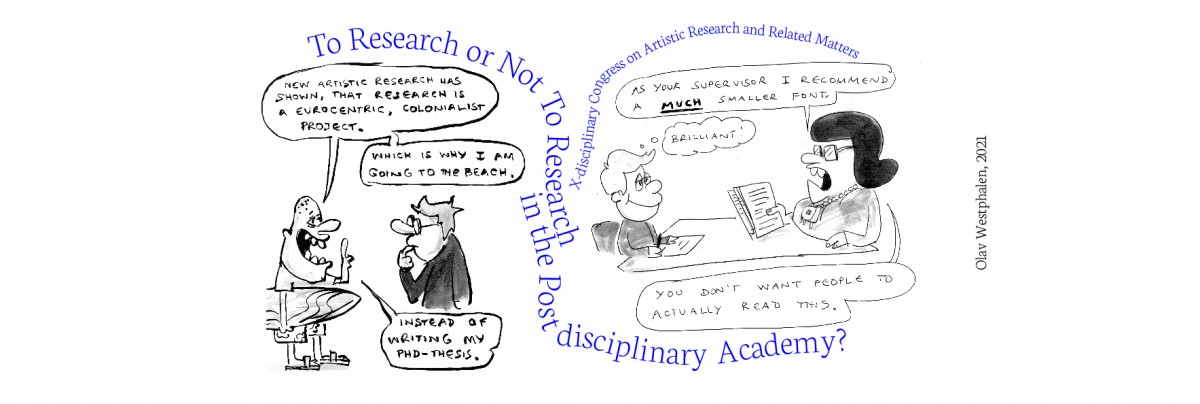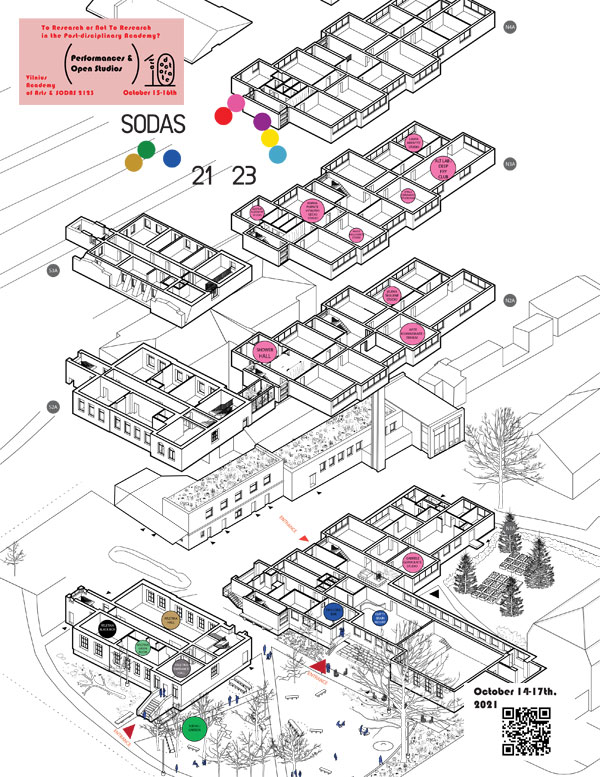Programme for Oct 14-17th. (PDF)
Abstracts of the contributions (PDF)
You are welcome to join in person or online our X-disciplinary Congress on Artistic Research and Related Matters at Vilnius Academy of Arts (Lithuania), October 14-17th, 2021. More than 120 artists and researchers will join in person and online to discuss "To Research or Not To Research in the Post-disciplinary Academy?" Congress will take place on-site in Vilnius Academy of Arts and in the new artists' cultural complex SODAS 2123.
Map of SODAS 2123 with Open studios and performances
Most of the congress will be carried on on-site in physical spaces, except Sunday which is purely online. Day programme (10am-6pm) will be accessible via Zoom also on the other days.
Please register until 11th of October and get your link for free participation
https://forms.gle/6UEBDa7c63YBnJjk6
>>>>>>>>>>>>>>>>>>>>>>>>>>>>>>>>>>>>>>
>>>>>>>>>>>>>>>>>>>>>>>>>>>>>>>>>>>>>>
To Research or Not To Research in the Post-disciplinary Academy?
X-disciplinary Congress on Artistic Research and Related Matters at Vilnius Academy of Arts (Lithuania), October 14-17th, 2021
Artists and researchers of any kind are welcome to apply with contributions that discuss urgent matters on the question of artistic research, the nature of its relationship with academia, and to artistic practice, the culture sector, and the art worlds. You can choose yourself what to insert instead of “X” in the x-disciplinary: non-, trans-, post-, un-, inter-, etc.
As a springboard for this conference, we follow the proposal by Charles Esche in ‘Include Me Out: Helping Artists to Undo the Art World’ where he writes of ‘certain educational fundamentals’ including ‘anti-specialization, anti-isolation/anti-autonomy, and anti-hierarchy’[1].
[1] Esche, Charles. 'Include Me Out: Help Artists to Undo the Art World'. In Madoff, S. H. (2009). Art school: (propositions for the 21st century). Cambridge, Mass: MIT Press, p. 102-112.
In light of this, we wish to ask:
- Is artistic research like and aligned to the contemporary academy, and if so, how?
- Is artistic research a post-disciplinary, un-disciplinary, meta-disciplinary and/or indisciplinary field of inquiry that because of this has the capacity to transform the institution?
- How does and should artistic research collaborate with fields (and research paradigms) outside of academia, and on what terms?
This first regional congress on artistic research marks the 10th Anniversary of the Doctoral Programmes in Arts in Lithuania (Vilnius Academy of Arts and Lithuanian Academy of Music and Theatre).
Ten years is a good point in a field or phenomenon’s maturation: it is getting closer to adolescence, has considerable learning to draw from, and the experience that enables it to imagine possible scenarios for the future. The phenomenon is mature enough so it makes no sense to return to the one and only answer what artistic research is. However, it is still very fresh to be fully recognised by other fields of research across the arts and sciences.
Thus far, most of the conferences on artistic research (SAR, EARN, SHARE) have been held in Western-Northern Europe; but with the proliferation of programmes in the Baltic countries and Eastern and Central Europe (from Estonia to Bulgaria and from Czech Republic to Georgia) it is now the right time to bring colleagues together from more proximate, as well as more distant, neighbourhoods.
The joint discussion aims to consider what the specific trajectories of schools, countries and regions are and how they correlate with the forerunners of doctoral programmes in the UK and the Nordic countries. Within the variety of cultures of doctoral studies, we hope to build a shared understanding of and to identify different cultures in the Doctoral programmes in the Arts.
The conference is organised around both (post)disciplinary and thematic issues. When applying, please indicate your preferred strand and format, or propose a new one. Event organisers are open to any format of presentation and will try to support and accommodate the specificity and materiality of various practices.
Formats: performative talk (15 min + 5 min discussion), performing with "the epistemic object" you have brought (20 min), discussion/panel (30 min), milestone & keynote lecture (30 or45 min), intervention in the space (5 min for activation), poster exhibition (5 min for activation), and similar.
Questions, topics and strands
- The Ontology and Epistemology of Artistic Research as a postdicipline, undiscipline, indiscipline, transdiscipline, or even paradiscipline and patadiscpline?
- Who is doing Artistic Research outside academy and outside any discipline?
- Practices and histories of Artistic Research and Artistic Writing in Central and Eastern Europe. What are the regional specifics of Artistic Research: from post-USSR (post-socialist) to Nordic, Baltic, Balkan and Central-Eastern-European dimensions?
- Who is doing Artistic Research in the Humanities, Social Sciences and Natural Sciences (STE(A)M, chair prof. Aldis Gedutis)? What is Artistic Resarch impact on the sciences and research methodology and epistemology?
- Where is artistic research in Fine Art, Media Art and Material-based Art (art practice as research, chair Doc. Dr. Žygimantas Augustinas)?
- When and how do you make artistic research in design and architecture? (spatial, design, and speculative research, chairs prof. Audrius Klimas, doc. Julijonas Urbonas)
- When happens Artistic Research in performing arts, film and literature (performative and fictional research, chair artist and writer Paulina Eglė Pukytė)?
- Language and Writing. The role of language, whether verbal or not, and its national variants, in artistic research. (In English & lietuviškai). Modes of expanded and diagrammatic writing. Is there any other lingua franca besides English in Artistic Research?
- Publishing and dissertating. Exposition and exhibition. What is actually a supplement in the Doctoral thesis (project): writing or portfolio (artwork)?
- Post-research and everything.
- And other topics offered by the applicants.
Artists and Researchers Committee
Dr. Akvilė Anglickaitė (VDA)
Doc. dr. Žygimantas Augustinas (VDA)
Doc. dr. Ramunė Balevičiūtė (Lithuanian Academy of Music and Theatre)
Prof. dr. Mika Elo (Helsinki University of the Arts)
Dr. Rokas Dovydėnas (VDA)
Prof. dr. Aldis Gedutis (Klaipėda University)
Prof. Audrius Klimas (VDA)
Doc. dr. Vytautas Michelkevičius (VDA, Chair)
Prof. dr. Agnė Narušytė (VDA)
Prof. dr. Lina Navickaitė-Martinelli (Lithuanian Academy of Music and Theatre)
Paulina Pukytė (artist, writer)
Prof. dr. Marquard Smith (VDA and UCL, London)
Dr. Rūta Spelskytė-Liberienė (VDA)
Doc. Julijonas Urbonas (VDA)
Organizing-Curating Committee (VDA)
Dr. Akvilė Anglickaitė (chair), Vytautas Gečas, dr. Marius Iršėnas, Laima Kreivytė, Robertas Narkus, doc. dr. Vytautas Michelkevičius, Alfreda Pilitauskaitė, dr. Ieva Pleikienė, doc dr. Eglė Ulčickaitė, doc. dr. Darius Žiūra
VDA = Vilniaus dailės akademija / Vilnius Academy of Arts
Dates & Venues
Conference dates October 14-17th, 2021
Funding: participation is free of charge for contributors. Selected contributions will be supported by a letter of acceptance for further funding applications.
Venue: Vilnius Academy of Arts and SODAS2123 (mostly onsite and partly online)
Artistic symposium: A performative Research Symposium-Festival organised by young doctoral researchers and artists will take place as part of the congress. The event will include open artists-researchers’ studios, performative actions, exhibition, collective social & dining activities, etc.
If you have any general questions, please contact Doctoral Department coordinator Alfreda Pilitauskaitė (alfreda.pilitauskaite@vda.lt) or event producer dr. Akvilė Anglickaitė (akvile.anglickaite@vda.lt). Content related questions should be addressed to the congress chair Vytautas Michelkevičius (vytautas.michelkevicius@vda.lt).
Congress is organised by Vilnius Academy of Arts. It is running Doctoral Programme in the Arts (Fine Art & Design) since 2010/2011. So far 33 doctoral candidates have defended their theses and 34 are on the way.
More about the congress www.vda.lt/en/doctoral-studies/congress-2021
Research project "Impact of Artistic Research to Humanities and Visual Arts. The Case Study of Lithuania in Global Context" was funded by a grant (No. S-LIP-20-19) from the Research Council of Lithuania. This research was performed in cooperation with Vilnius Academy of Arts and Klaipėda University.





